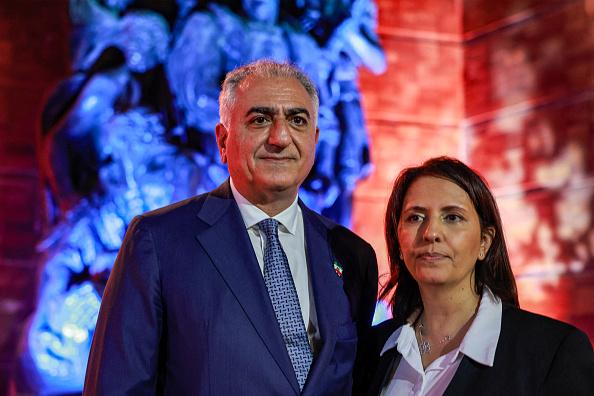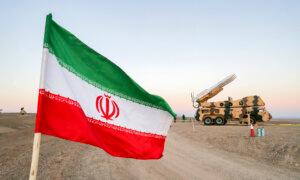Iran and Israel enjoyed warm ties until the Islamic regime rose to power in Iran said an expert.
News Analysis
Around midnight on April 13, Iran launched a series of missile and drone attacks against Israel in retaliation for Israel’s alleged bombing of a building adjacent to the Iranian embassy in Syria. Israel appeared to have carried out retaliatory strikes on military targets in Iran on April 19.
However, few people know that Iran was once one of Israel’s rare allies in the Muslim world, with the two nations enjoying close relations. However, since Iran’s Islamic Revolution in 1979, Iran has taken a completely different path, making Israel one of the Islamic Republic’s top archenemies.
On NTD’s Chinese-language program “Pinnacle View,” a group of panelists discussed the context conflict in the Middle East with the Iranian regime. NTD is an independent Chinese television network, based in the United States.
Enemy of the Regime
Independent television producer Li Jun said on NTD’s Chinese-language program “Pinnacle View” that animosity between Iran and Israel only began in 1979 after the Islamic Revolution in Iran, which saw the overthrow of the previous Pahlavi dynasty by the theocratic Islamic Republic.
Mr. Li explained that after the rise of Ayatollah Khomeini to power after the Islamic Revolution, he employed an extreme anti-Semitic stance toward Jews, and he advocated for the destruction of Israel. This ideology eventually became Iran’s national strategy.
In response to Iran’s transformation, Israel also altered its policies, leading to increasingly hostile relations between the two. However, Mr. Li mentioned that historically, the relationship between Israel and Iran, or rather the Jewish and Persian peoples, was very close. They had 2,400 years of friendship. The Jewish people established their state in Israel with Jerusalem as the capital around the 11th century B.C., which later split into the Kingdom of Israel and the Kingdom of Judah. Both kingdoms were later conquered by the Assyrian Empire and the Babylonian Empire. During the rule of Cyrus the Great around 550 B.C., the Persian Empire was established, which eventually conquered the Babylonian Empire, freeing the Jewish people and allowing them to return to the land of Israel to rebuild the Temple of Solomon.
In A.D. 651 when the Arab Empire conquered the Persian Sassanian dynasty and began Islamization, if one did not convert to Islam, they were considered second-class citizens, leading to Persian Jews’ status as second-class citizens for nearly a thousand years.
It was only in 1661, during the Safavid dynasty, that a king declared respect for the freedom of the Jewish faith, allowing Jews to resume their beliefs. From then until the 20th century, Jews and Iranians enjoyed a good relationship. The constitution of the Pahlavi dynasty in the 20th century also respected religious freedom, and some Jews even held positions in the government.
When Israel was established in 1948, the Arab countries went to war with Israel. Due to sectarian conflicts, Iran did not have good relations with the Arab countries, so Iran and Israel enjoyed warm ties. During this time, most of Israel’s oil imports came from Iran, and there were even Iranian-Israeli military links. At the time, both Israel and Iran had established a good relationship with the United States.
All this changed after the 1979 Islamic Revolution.
Similarities Between Islamism and Communism
Chinese political commentator Zheng Xuguang said on the show that Iran sees itself as the heir to Persia. Historically, Persia was generally tolerant of different religions as long as they did not challenge the empire.
However, after the exile of Mohammad Reza Pahlavi, the last monarch of Iran, the emerging Islamic regime became highly ideological. It adopted neither a liberal democracy nor Soviet-style communism. Ayatollah Khomeini opposed both the Western world represented by the United States and the communist world represented by the Soviet Union. They sought to govern the Islamic Republic with Islamic law, creating a new ideological state, unprecedented in Persian history.
 Israel's Intelligence Minister Gila Gamliel (right) and Crown Prince Reza Pahlavi; activist, advocate, and oldest son of the last Shah of Iran, attend a ceremony marking Yom HaShoah, Holocaust Remembrance Day for the six million Jews killed during World War II, at the Yad Vashem Holocaust Memorial in Jerusalem on April 17, 2023. (Menahem Kahana /AFP via Getty Images)
Israel's Intelligence Minister Gila Gamliel (right) and Crown Prince Reza Pahlavi; activist, advocate, and oldest son of the last Shah of Iran, attend a ceremony marking Yom HaShoah, Holocaust Remembrance Day for the six million Jews killed during World War II, at the Yad Vashem Holocaust Memorial in Jerusalem on April 17, 2023. (Menahem Kahana /AFP via Getty Images)Mr. Zheng compared Iran’s Islamic regime to communist China. Iran’s rejection of Israel is purely a new ideological revolution, similar to how the Chinese Communist Party (CCP) took over China and adopted an anti-Western stance.
He explained, “The current Islamic Republic of Iran seeks to expand its influence by funding and supporting terrorist organizations like Hamas and Hezbollah, similar to what the Soviet Union did to export its communist revolutions to other countries.”
A Backward Trend
Guo Jun, the editor-in-chief of the Hong Kong edition of The Epoch Times, said on “Pinnacle View” that over the past century, many countries have experienced reversals on the path of modernization, and Iran is not the first nor the last.
“For example, Germany’s industrial manufacturing capacity surpassed Britain’s at the end of the 19th century,” she said. “However, within a year of Adolf Hitler’s rise to power in 1933, Germany regressed. The entire country experienced significant setbacks in social development and civilization.”
Ms. Guo explained that Iran’s situation is more complicated than Germany’s because of the religious factor. Although Iran’s economy developed rapidly in the 1960s and 1970s, the rapid economic development under the monarchy led to inequalities, which led to a revolution by Islamists and various leftist, communist insurgent groups. In the end, it was the Islamists that took power, and their influence on Iranian society was significant.
She further pointed out that many countries went on a backward trend in the past century, such as Cuba, Argentina, Venezuela, Iran, and so on. All of those countries were once prosperous and enjoyed a great relationship with the Western world. One of the common features among those countries that led to their decline is that they have adopted either communism, socialism, or radical Islamism.
Michael Zhuang contributed to this report.














 English (US) ·
English (US) ·  Turkish (TR) ·
Turkish (TR) ·